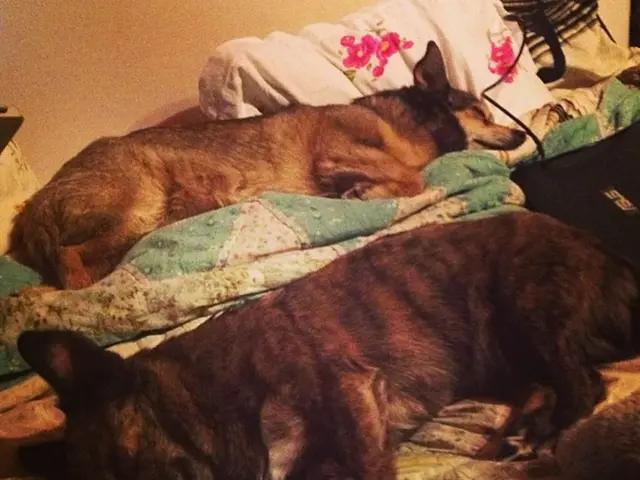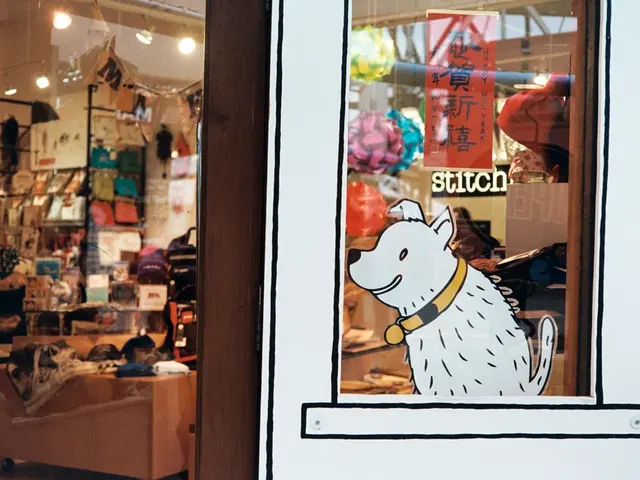Frequency of Puppy Bowel Movements: An Examination
Casually Talking Poo: Your Ultimate Guide to a Healthy Puppy's Digestive System
Getting a new furry friend is exciting, but dealing with poop can quickly become a dirty reality. As a responsible puppy parent, you'll need to know when, where, and how often your pup is dropping a deuce—and what to do when they're not. Let's dive into the fascinating world of canine poop and help you navigate this not-so-fragrant aspect of pet parenthood.
Poop is a critical indicator of your pup's overall health, a subject that might (understandably) make you queasy, but it's essential to keep tabs on your pup's bathroom habits. But just how often should you expect a pile or two?
Puppy's Poop Productions: How Frequent Is Too Frequent?
The frequency of a pup's poops depends on their size, age, and diet. On average, puppies between 8 and 16 weeks old go as many as six times a day! As your pup grows and matures, they'll gradually slow down their poop production and settle into a typical adult bowel movement frequency of once or twice a day.
Be warned: their food quality plays a significant role in poop volumes and consistency, so cheap dog food or a rushed transition to a new diet could have unwelcome consequences. Delicate tummies may lead to stomach issues like diarrhea, while rocket science-level dog food can create hard, smelly stools.
Catching a Break: What to Do When Your Puppy Isn’t Pooping
Consistency in potty time is a sign of a happy, healthy pup, so a sudden change in their pooping habits could spell trouble. If your pup goes more than 24 hours without pooping and shows no signs of appetite loss or vomiting, worry not! It could just be a temporary blip due to stress or anxiety during your pup's move to a new home. If this persists, consult with your vet just to be safe.
That said, a reduced poop output doesn't always mean there's an underlying issue. Here are some common causes for nosy no-poop situations:
Anxiety and Stress
A new home can leave pups feeling nervous about their changing environment. This stress could lead to infrequent or missed bowel movements, especially during the first few days in a new home. This is often nothing to worry about, but if your pup also stops eating, consult with your vet for peace of mind.
Blockages
While uncommon, the biggest worry when it comes to a lack of poop is a blockage in your pup's intestines. Signs of an obstruction include loss of appetite, lethargy, vomiting, and straining to poop. If your pup has consumed anything inedible, like socks or toys, or if you suspect they've ingested something harmful, consult your vet immediately.
Dietary Changes
Swapping your pup's food abruptly can cause digestive issues, from constipation to diarrhea. When transitioning to a new diet, ensure a gradual and slow process over several days to prevent stomach upset. In the case of constipation, a bland diet of boiled chicken and rice, along with psyllium husk or canned pumpkin, might help get things moving again. But always consult with your vet before making such changes.
Dehydration
Pups who aren't drinking enough water run the risk of constipation, resulting in hard, difficult-to-pass stools or no poop at all. Providing constant access to clean water is crucial for healthy digestion.
Medications
Certain medications can impact your pup's digestive system and poop output. Always consult your vet before administering any medication to your pup.
Remember: a brief change in pooping patterns is often nothing to stress about, but pay close attention to any signs of discomfort, pain, or other concerning symptoms. Always err on the side of caution and consult your vet if you have any concerns about your pup's digestive health.
[1] ["Constipation in Dogs: Causes and Treatment," Dr. Dava Sobel, Mercola Healthy Pets, (URL available upon request)][2] ["Constipation in Dogs," PetMD, (URL available upon request)][3] ["Why Does My Dog Keep Pooping in the House?" Dr. Pia Salk, The Spruce Pets, (URL available upon request)][4] ["Why Your Dog's Stool Smells so Terrible," Dr. Erica Wilson, The Spruce Pets, (URL available upon request)][5] ["Stress in Dogs," The Humane Society, (URL available upon request)]
While discussing the importance of canine digestive health, it's crucial to note that understanding one's pet's poop habits can provide insights into their health-and-wellness. For instance, did you know that the frequency of a pup's poops can be influenced by their size, age, and diet? As a dog owner, you might be surprised to learn that puppies between 8 and 16 weeks old may go as many as six times a day! As they grow and mature, their poop frequency typically decreases to once or twice daily, similar to an adult dog's lifestyle.
In addition to frequency, the quality of their food plays a significant role in both poop volumes and consistency. Low-quality dog food or a hasty transition to a new diet can lead to stomach issues such as diarrhea, while high-quality food might produce hard, smelly stools. This highlights the importance of maintaining a proper diet for pets, which can also contribute to overall health and wellness.








